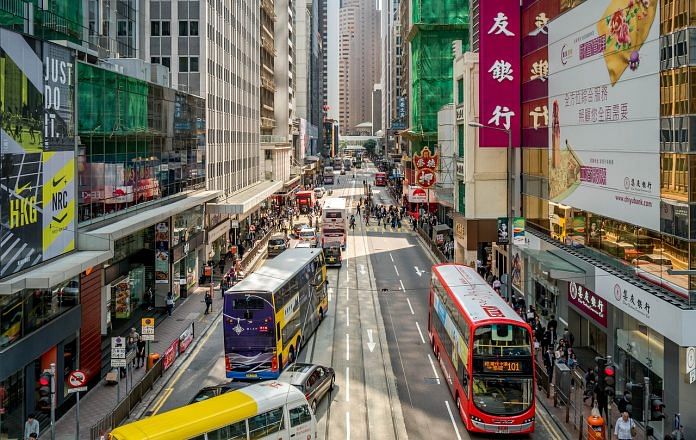Hong Kong: The world economy’s fragile recovery is in danger of stalling.
A resurgence of coronavirus infections across the Asia Pacific region, which was considered to have broadly curbed the virus more effectively than elsewhere, is being viewed as an early warning for the rest of the world.
The pandemic continues to rage in parts of the U.S., hot spots in Europe and across big emerging economies including India and Brazil. With little prospect of a circuit breaker until a vaccine is discovered and distributed, governments are having to double down on the $11 trillion dollars worth of stimulus and unprecedented central bank support unleashed since the crisis began.
The Federal Reserve meets this week to decide on interest rates as U.S. lawmakers debate another $1 trillion fiscal stimulus package. The European Union has just signed off on a planned 750-billion euro ($878 billion) crisis package and governments everywhere are having to extend support programs.
“The global economic recovery is at risk,” said Mark Zandi, chief economist at Moody’s Analytics. “Key to ensuring the global economy doesn’t slide back into recession in coming months is continued aggressive monetary and fiscal support.”
Also read: Colleges tap tech to calm students paying thousands of dollars for online classes
Growth drivers
A lot will depend on how quickly consumer confidence can be restored, with travel and tourism still in the doldrums and keeping a lid on pent up demand. Sentiment will also be driven by how successful the virus is controlled and how soon those out of work can find a job.
Big global brands including Deutsche Lufthansa AG, Airbus, Marks & Spencer Group Plc and Microsoft Corp.’s LinkedIn professional network are all shedding jobs. Yelp Inc. estimates that more than half of the U.S. business closures that were temporary when the virus outbreak began are now considered permanent.
“Since consumers were the leading force for exceptional performance and robust employment through 2019, until the consumer comes back, global growth will underperform,” said Catherine Mann, Citigroup Inc. chief economist and former chief economist for the Organization for Economic Cooperation and Development.
Goldman Sachs Group Inc. warned that Asia-Pacific economies, which accounted for more than 70% of global growth in 2019, passed a major inflection point in June when the pace of the region’s reopening “slowed materially,” and significant challenges loom.
The region’s economies have reached ‘the end of the beginning’ of the recovery,” according to Andrew Tilton, Goldman’s chief economist in APAC.
While China’s economy returned to growth last quarter and readings on industrial output have shown a V-shaped rebound, both consumer demand and private investment remain weak.
The U.S. rebound is stalling after coronavirus infections spiked in a host of states.
Jobless claims rose for the first time since March in the week ended July 18, ticking up to 1.42 million. Restaurant bookings have stopped increasing nationwide and remain at about one-third of year-earlier levels. Consumer sentiment as measured by the University of Michigan soured this month as the virus spread.
There’s been a “notable loss of momentum” in the U.S, said JPMorgan Chase & Co. economist Michael Hanson. Former U.S. Treasury Secretary Lawrence Summers and a paid contributor to Bloomberg said in a July 25 interview on “Bloomberg Wall Street Week” that he “can’t remember a moment when a recovery has been more uncertain.”
There are better signals from Europe, with private-sector activity in the euro area rising to the highest in more than two years in July as both services and manufacturing expanded. In the U.K., retailers saw sales volumes rise in June close to pre-lockdown levels, even as social distancing measures prevented a complete return to normal.
High frequency data on Germany’s economy that tracks indicators such as restaurant bookings and job postings are trending up and business confidence is improving. That kind of traction bodes well for a relatively modest recovery in the second half of this year, said Barclays Bank Plc’s London-based head of economic research, Christian Keller.
“It was to be expected that after the lockdowns had created severe contraction in activity, the reopening would bring some initial rebound, in particular in pent-up consumer demand, which would then slow afterwards,” he said.
Other reasons to expect a sharp rebound include a better ability to manage outbreaks of the virus, progress in the search for a vaccine and the massive stimulus, according to Morgan Stanley economists led by Chetan Ahya. They estimate central banks in the U.S., euro region, Japan and U.K. are expanding their balance sheets by 28% of GDP by the end of next year.
Even when a vaccine does come, there’s going to be a wait before it’s available globally, former Indian central banker Raghuram Rajan told an online conference last week organized by DBS Group Holdings Ltd.
“The earliest economies will come back to full operation is probably in the second or third quarter of next year, even with everything going as planned, which in this world is hard to imagine,” he said.-Bloomberg
Also read: Intel fires its Indian-origin chief engineer Murthy Renduchintala for production failures



